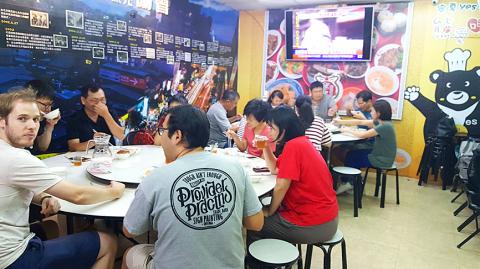The introduction of multilingual menus and other efforts by food stalls at Taipei’s Ningxia Night Market (寧夏夜市) to attract more international travelers in a bid to offset a decrease in Chinese travelers have been well-received.
The owners of food stalls and restaurants in and around the night market have begun offering services in English, Japanese, Korean and French, and have begun cooperating with travel Web site Klook to promote their businesses.
The efforts have already begun paying off, they said, adding that they have fared better than others in the tourism industry as a result.

Photo: Yang Hsin-hui, Taipei Times
China early this month instituted limits on travel to Taiwan by individual travelers.
“Although Ningxia is not near a MRT [metropolitan rail line] station like the Shilin (士林夜市) or Raohe (饒河夜市) night markets, it has its own special style,” said one owner, surnamed Lin (林). “While everyone is in a panic about the loss of Chinese tourists, we are unwavering.”
It is no accident that Ningxia has started attracting international tourists, Ningxia Night Market Tourism Association director Tim Lin (林定國) said on Saturday last week.
All signs at the night market are in at least two languages — Chinese and English — and many have as many as five, he said.
The owners of some of the stalls can speak a little of each language, which makes them more approachable for foreigners, he added.
“Foreign tourists who see their language on signage will feel that they are valued. It is like when Taiwanese travel abroad and see Chinese — they are happy and leave with a good impression,” proprietor Lin said.
The owners of Ningxia’s stalls and restaurants also prioritize cooperation to attract visitors over competing with one another, Tim Lin said.
Ningxia also distinguishes itself from other night markets through its annual “thousand years banquet” (千歲宴), which allows various establishments showcase their signature dishes, he said.
The banquet got its name from adding up the 50-year histories of each of the 20 establishments that participate, he added.
It was also the first night market in Taipei to allow electronic payment through services including EasyCard, Jkopay and Alipay, Tim Lin said.
International visitors can also rest assured that the food is safe, as stalls have quick response codes that visitors can scan to see a list of ingredients and from where they are sourced, he said.
Through Klook, visitors can find information about events held at the night market and download discount vouchers, he added.
One US tourist named Tom said that he had heard from a friend that there were many delicious and inexpensive food options at Ningxia.
Seeing signs and menus in English left him with a very good impression, he said.

US climber Alex Honnold is to attempt to scale Taipei 101 without a rope and harness in a live Netflix special on Jan. 24, the streaming platform announced on Wednesday. Accounting for the time difference, the two-hour broadcast of Honnold’s climb, called Skyscraper Live, is to air on Jan. 23 in the US, Netflix said in a statement. Honnold, 40, was the first person ever to free solo climb the 900m El Capitan rock formation in Yosemite National Park — a feat that was recorded and later made into the 2018 documentary film Free Solo. Netflix previewed Skyscraper Live in October, after videos

NUMBERS IMBALANCE: More than 4 million Taiwanese have visited China this year, while only about half a million Chinese have visited here Beijing has yet to respond to Taiwan’s requests for negotiation over matters related to the recovery of cross-strait tourism, the Tourism Administration said yesterday. Taiwan’s tourism authority issued the statement after Chinese-language daily the China Times reported yesterday that the government’s policy of banning group tours to China does not stop Taiwanese from visiting the country. As of October, more than 4.2 million had traveled to China this year, exceeding last year. Beijing estimated the number of Taiwanese tourists in China could reach 4.5 million this year. By contrast, only 500,000 Chinese tourists are expected in Taiwan, the report said. The report

Temperatures are forecast to drop steadily as a continental cold air mass moves across Taiwan, with some areas also likely to see heavy rainfall, the Central Weather Administration (CWA) said. From today through early tomorrow, a cold air mass would keep temperatures low across central and northern Taiwan, and the eastern half of Taiwan proper, with isolated brief showers forecast along Keelung’s north coast, Taipei and New Taipei City’s mountainous areas and eastern Taiwan, it said. Lows of 11°C to 15°C are forecast in central and northern Taiwan, Yilan County, and the outlying Kinmen and Lienchiang (Matsu) counties, and 14°C to 17°C

STEERING FAILURE: The first boat of its class is experiencing teething issues as it readies for acceptance by the navy, according to a recent story about rudder failure The Hai Kun (海鯤), the nation’s first locally built submarine, allegedly suffered a total failure of stern hydraulic systems during the second round of sea acceptance trials on June 26, and sailors were forced to manually operate the X-rudder to turn the submarine and return to port, news Web site Mirror Daily reported yesterday. The report said that tugboats following the Hai Kun assisted the submarine in avoiding collisions with other ships due to the X-rudder malfunctioning. At the time of the report, the submarine had completed its trials and was scheduled to begin diving and surfacing tests in shallow areas. The X-rudder,